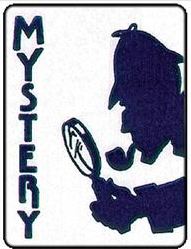Contents
09X Call Number & Classification
Adult Fiction & Non-Fiction
Bilingual Books
Chicken Soup Books
245 Title Statement
Cartoon Books
245 |c Statement of Responsibility
250 Bilingual Edition Statement
264 Publication Information
264 |b Name of Publisher
264 |c Date of Publication, Copyright, etc.
Reprints & Printing Dates
Facsimile Reproductions/Reprints
3XX Physical Description
300 |a Extent
300 |b Other Physical Details
300 |e Accompanying Material
490/830 Series Statement
5XX Notes
Volume Note
Item Entry and Processing
Physical Processing
Processing Adult Hard Cover / Permanent Collection Material
09X Call Number & Classification
092 123 = DDC
099 ABC = cutter
- Key study guides (published by Castle Rock Research Corp.) for grades 7-9 are classed as TEEN rather than Juvenile.
Adult fiction and non-fiction
ABC
123 ABC
French ABC
French 123 ABC
09X Bilingual Books
- Bilingual books contain the entire text in two languages. Include the non-English language as part of call number, e.g.
099 J Spanish ABC
092 Chinese 641.5 ABC
- For bilingual titles that include text in a Canadian or U.S. Indigenous language and a non-English language, include the Indigenous language as part of the call number, regardless of prominence.
- For all other titles; if neither language is English, choose the call number language based on prominence.
- For multilingual books, do not include a language as part of the call number, except for titles with text in a Canadian or U.S. Indigenous language that were purchased for the Indigenous Collection. For these titles include the Indigenous language as part of the call number, e.g.
099 J Cree BOU
092 J Cree 497.332 ITW
- For all titles that have a language in the 09X, ensure that the language code in the 008|35-37 matches the language in the call number.
- Exceptions: If the content and layout clearly emphasize the English language content, exceptions may be warranted, e.g.
092 839.1 YID
Yiddish humor : humor and heart from the old country (font sizes always emphasizing the English-language proverb)
- Given their smaller format, Board books are another exception to this practice.
- Exceptions may also be made when EPL policy dictates giving primacy to one language, e.g. in the case of English-French government publications, English is always preferred. When in doubt, consult with a cataloguing librarian for direction.
- For bilingual dictionaries and language instruction titles see DDC, 4XX Languages & Dictionaries
- For bilingual works of literature see DDC, 8XX Literature
09X “Chicken Soup” Books
- Class “Chicken soup” titles with the specific subject, e.g.
245 Chicken soup for the gardener’s soul
092 635.0973
245 Title Statement
245 Cartoon Books
- If the title of a cartoon strip does not begin the 245, make a 246 (if possible) or 490 and 830 or a 500 note to identify the strip title.
245 |c Statement of Responsibility
- In the statement of responsibility, record only statements significant from the point of view of intellectual and artistic content; include only the names of those whose contributions are of bibliographic significance.
- For editors, bibliographic significance means revision or elucidation of the text and the addition of an introduction, notes and other critical matter. Exclude from 245 "in-house" editors, editorial supervisors, publications editors, managing editors, photo-editors, sponsoring editors, etc.
- For others in the 245, exclude technical credits, often performed by in-house staff members of publishing firms, such as book design, consultant, cover and page design, cover artist, cover designer, layout artist, page make-up, production manager.
250 Bilingual Edition Statement
- Bilingual books contain the entire text in two languages. Include a 250 edition statement as follows, e.g.
250 \\ $a[Bilingual: French-English].
250 \\ $a[Bilingual: Arabic-English].
250 \\ $a[Bilingual: Chinese-English].
250 \\ $a[Bilingual: Arabic-French].
250 \\ $a[Bilingual: Tagalog-English], 1st ed.
264 Publication Information
264 |b Name of Publisher / Distributor / Printing area
Determining Publisher/Imprint Relationships
- Transcribe the publishers' name(s) as they appear on the source of information, in order of preference (see RDA 2.8.1.4 & 2.8.4.2):
- the same source as the title proper
- another source within the resource itself
- one of the other sources of information specified at 2.2.4.
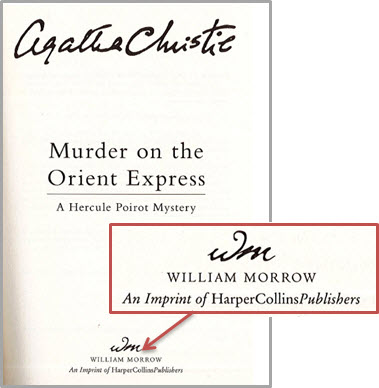
- Notes such as "... an imprint of ..." indicates a subordinate imprint, as does "... division of ...". "Formerly ..." indicates that a simple name change has taken place.
- In addition, the same ISBN prefix indicates that a publisher is unchanged even when imprint varies. "... by arrangement with ..." means a different publisher is involved.
Special cases
- Distributor Peter Smith
- Books distributed by the above have original title page and should be catalogued according to title page imprint. Add 500 note.
500 Peter Smith appears on spine.
- See also Cataloguing Overview 26X Publication for more information.
264 |c Date of Publication, Copyright, etc.
- Keep in mind the following when determining date of publication and copyright (also RDA 2.8-2.11):
- Found on book copyright date; no publication date.
- 264 \1 |c[1982].
- 264 \4 |c©1982
- Date supplied by LC/CAN source; copyright found on book.
- 264 \1 |c [1983].c1982.
- 264 \4 |c©1982
- Found on book published 1983, date of copyright the same or found on book 1st ed. 1983.
- 264 \1 |c1983.
- 264 \4 |c©1983
- Found on book publication and different copyright date.
- 264 \1 |c1983, c1982.
- 264 \4 |c©1982
- Found on book multiple copyright dates. Use date of publication plus most recent copyright date (excluding renewals and copyrights for other versions).
- Relative Happiness, Copyright ©2005, 2008 Lesley Crewe
- 264 \1 |c[2008].
- 264 \4 |c©2008
- Found on book original copyright and renewal dates (obsolete copyright allowed on renewal after 28 years). Ignore copy renewal date.
- Agatha Christie's After the Funeral, ©1953, ©2011 ; First Harper Paperback published 2011, First William Morrow Paperback published 2014
- 264 \1 |c2014.
- 264 \4 |c©1953
- Found on book date of copyright for 1980 illustrations (or introductions, etc.) and no date of publication but copyright of text 1979. Estimate date of publication based on content, or use copyright date for text.
- 264 \1 |c[1980], c1979 [if illustrations are a prominent part of book]
- OR
- 264 \1 |cc1979 [if illustrations are minor]
- Found on book copyright for different translations, versions, etc. Ignore all publication and copyright dates for other editions; i.e. other translations, revisions, etc.
- Jean-Patrick Manchette's The Gunman, English edition ©2002, original French edition ©1981
- 264 \1 |c[2002].
- 264 \4 |c©2002
- Can add a 500 note for original work, e.g. Translation of: La Poisiton du Tireur Coué ©1981.
- Found on book copyright date; no publication date.
Reprint
- A reprint with new illustrations, introductions, prefaces, etc. may or may not be regarded as a new edition.
- Record the original date of copyright.
Printing dates
- When the publication date is missing, the date of first printing may be used to infer the date of publication; enclose this in square brackets.
First printing 1982, copyright 1980
264 |c [1982], c1980.
- First printing and copyright dates are the same other printing or impression dates (i.e. second, third, etc.) cannot be used as the date of publication.
First printing 1982, copyright 1982.
260 |c c1982. OR 260 |c c[1982].
Facsimile Reproductions/Reprints
- Follow RDA 24.4.3 for reproductions of printed texts (often referred to as “reprints”), i.e. take all bibliographic data, including publication details, from the current reproduction; give all the relevant details of the original item in a single 500 note, e.g.
Kessinger reprints
260 [Whitefish, MT] :|bKessinger Pub.,|c[2008?]
490 Kessinger Publishing’s rare reprints
500 Reprint. Originally published by Page Co., Boston, 1907.
830 Kessinger Publishing’s rare reprints
3XX Physical Description
300 |a Extent
300 (various pagings)
- If the pages are unnumbered use:
300 ca. 999 p.
- If the pages are numbered in a complicated way use:
300 1 v. (various pagings)
300 Multi-volume sets
- For items which were originally issued as a single complete item and are later issued as separate volumes (but are otherwise duplicates) add a 500 note to the record indicating the difference.
500 Some copies issued in separate volumes.
- Recatalogue the original item to add to label v. 1-2.
- For items which were originally issued in separate volumes and are now complete as a single item, add a 500 note to record and label current item v. 1-2. See 500, Volume Note.
500 Some copies complete in one volume.
300 |b Other Physical Details / Illustrations
- Generally keep illustration statements brief: "ill." should, in most cases, be sufficient to include most illustrations; when necessary, list individually. Accept illustration statements in derived records as is.
- For books that have musical notation throughout the text and/or include a piece of music as an incidental (non-predominant) form of text, describe in field 300 as:
21 pages : illustrations, music ; 21 cm.
- See also Music Scores.
300 |e Accompanying Material
- For instructions on deciding whether to catalogue an item as a book with a CD or as a CD with an accompanying book, see Cataloguing Overview, Determining predominant format
- If computer disk(s)/disc(s) accompany an item, record in 300 |e. Do not give further description of accompanying material. Delete 538 or a 500 which describe system requirement details. A CD-ROM is a "disc", an optical medium; a floppy disk/diskette is a "disk", a magnetic medium. If appropriate, also add a 500 note.
300 +|e 1 computer disk
300 +|e 1 CD-ROM
500 CD-ROM in pocket.
Contents label: 1 book
1 CD-ROM
- When a compact audio disc (CD) accompanies a book use 300 |e 1 sound disc, e.g.
300 350 p. :|b ill. ;|c 23 cm. + |e 1 sound disc.
500 CD in pocket.
Contents label: 1 book
1 CD
- When a DVD (Digital video disc) accompanies a book use 300 |e 1 DVD, e.g.
300 100 p. ; |c 28 cm. + |e 1 DVD.
500 DVD in pocket.
Contents label: 1 book
1 DVD
- When a Blu-ray disc accompanies a book use 300 |e 1 Blu-ray disc, e.g.
300 100 p. ;|c28 cm. +|e1 Blu-ray disc.
500 Disc in pocket.
Contents label: 1 book
1 Blu-ray
- When a DVD-ROM (i.e. a DVD disc for a computer) accompanies a book, use 300 |e 1 DVD-ROM, e.g.
300 100 p. ;|c28 cm. +|e1 DVD-ROM.
500 DVD-ROM in pocket.
Contents label: 1 book
1 DVD-ROM
- When an MP3 disc accompanies a book, use 300 |e 1 MP3 disc, e.g.
300 192 p. ;|c26 cm. +|e1 MP3 disc (Vendors are using 1 sound disc (digital, MP3 file ; 4 ¾ in)).
500 MP3 disc in pocket.
Contents label: 1 book
1 MP3 disc
- If duplicate copies arrive with accompanying disc/disk for a title, which formerly was published without accompanying material, use the title record without changing the 300 description. Add a note 500 Some copies have CD-ROM in pocket.
- If it is discovered that an accompanying DVD or CD-ROM requires registration to use, i.e. single-use only, see Cataloguing Overview, Single use accompanying items.
490 / 830 Series Statement
490/830 Capital City Press Collection note
490/830 Capital City Press Collection.
490/830 North of 52 Collection note
- For all titles in the EPL North of 52 Collection, including print and non-print formats.
490/830 North of 52 Collection.
5XX Notes
500 Notes from dust jackets
- Notes quoting from book jackets are permitted if information is not provided elsewhere in the description and is important, i.e. about the format or nature of the work, to justify an access point or to provide keyword access to a featured character, e.g.
500 “Previously published as the separate novels Mutineer’s moon, The armageddon inheritance, and Heirs of empire”--Jkt.
500 “Published to accompany a major retrospective exhibition…at the Indiana University Museum of Art”--Jkt.
500 “A Wild Onion, Ltd., mystery”—Jkt.
- Information which can be included in fields 245 or 250 using square brackets need not be identified with a quoted note from jacket, e.g.
245 English-Tigrigna dictionary /|c[compiled by Abdel Rahman].
not
500 “Compiled by Abdel Rahman”—Jkt.
250 [Bilingual: Spanish-English] or [50th anniversary ed.] or [Rev. and expanded edition]
not
500 “Bilingual ed.”—Jkt. nor “50th anniversary ed.”—Jkt. nor “Revised and expanded edition”—Jkt.
- This information will display in brief catalogue displays and would not be seen as readily if recorded in notes.
- Free-text notes, based on important information found in any source, can be provided by the cataloguer and need not be quoted, e.g.
500 Featuring Jane Whitefield.
500 Notes for vendor-catalogued mass market paperbacks
- Make appropriate notes to describe differences between regular copies and vendor-catalogued mass market paperback copies that are attached to the same record.
500 Assigned as adult in the paperback collection.
500 Assigned as Teen nonfiction in the paperback collection.
500 A romance novel in the paperback collection.
500 Canadian creator note
- For print works of Fiction by authors who are identified as Canadian and print works of "belles lettres," such as essays, humour, poetry and drama, by Canadian creators in English and French, include a 500 note as follows:
500 Canadian creator.
- Use of this note is limited to instances where the Canadian creator appears in the 1XX field, not 7XX fields. This applies to Canadian authors, musicians and illustrators, but not to translators or editors.
- English and French nonfiction print titles eligible for this note will have a base DDC number of 819.1 or 848.992.
- This note signals the assignment of Itemcat 1 = CANNF (for Canadian essays, humour, poetry, and drama originally in or translated into English); classed in 819.1 or 848.992 or WLFRENFCAN (for Canadian essays, humour, poetry, and drama originally in or translated into French); classed in French 819.1 or French 848.992.
- World Language books (in languages other than French) by Canadian creators, whether original publications or translations, receive the same 500 Canadian creator note in the bibliographic record and have a maple leaf label affixed to the spine. The item records will have Itemcat1 values reflecting the language of publication (e.g., WLCHIF).
- When spot checking vendor-supplied records for WL books, it isn’t necessary to do extensive research to determine the nationality of the author(s). If the record has the 500 note and the item is labelled with a maple leaf, presume that this is correct. In a case where the 500 note is missing/no maple leaf label has been affixed for an author like Margaret Atwood or Louise Penny, add a 500 note and flag for the IEPs.
Volume Note
- For items, which were originally issued as a single complete item and are later issued as separate volumes (but are otherwise duplicates) add a 500 note to the record indicating the difference.
v. 1-2
500 Some copies issued in separate volumes.
- For items, which were originally issued in separate volumes and are now complete as a single item, add a 500 note to record and label current item.
v. 1-2
500 Some copies complete in one volume.
Item Entry and Processing
Physical Processing
- Spine labels, RFIDs, and any other labels are affixed.
- In Process forms are removed.
- Call numbers are left-justified on the labels starting at the top of the label. The maximum number of lines on a spine label is seven.
- Call numbers with five or more digits following the decimal have a line break before the decimal.

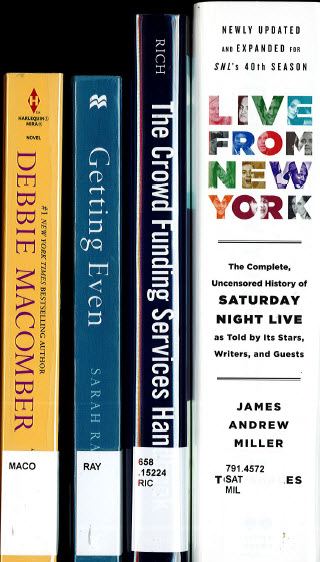
- Discard dust jackets lacking a Mylar cover if the book cover art matches the dust jacket art
- Dust jackets are only discarded if all info included is also printed on the book cover. This is rare.
- Genre labels are typically applied on the spine label below the call number for the hardcover/permanent collection.
- The maple leaf label to identify Canadian fiction authors is usually placed on the spine label below the call number, unless a genre label is present; in those instances the maple leaf is applied above the spine label.
- Genres are assigned to J and TEEN fiction only in English; not E books.
- A maximum of one genre label will be affixed per item; if more than one applies, the genre hierarchy (Adult fiction hierarchy and Juvenile fiction hierarchy) are used to determine the label.
- Try not to cover author or title information when affixing labels, but, if necessary, cover author rather than title.
- Stamp location stamp on top edge of books. Two sizes of stamps are available: use the larger ones for most books, and the small ones for thin books where the larger stamp would not be legible. Try to edge stamp all books where the pages (book block) is more than 4 mm thick; if the book is too thin and cannot be “fanned” to produce a legible stamp, stamp the front endpaper in the top right hand corner. For dark coloured endpapers, affix a white label and stamp label. English language large print books for all locations are stamped using the “EPL-LP” stamp on the top edge.
- Affix a D4, square RFID tag to the inside of the back cover, approximately 0.5” in from the spine, at various positions in the lower half of the book. If maps or other important information exists on the end sheet, the tag is placed on the left-hand side of the end sheet. If this is not available, affix tag to an unprinted area within the last few pages of the book, close to the spine.
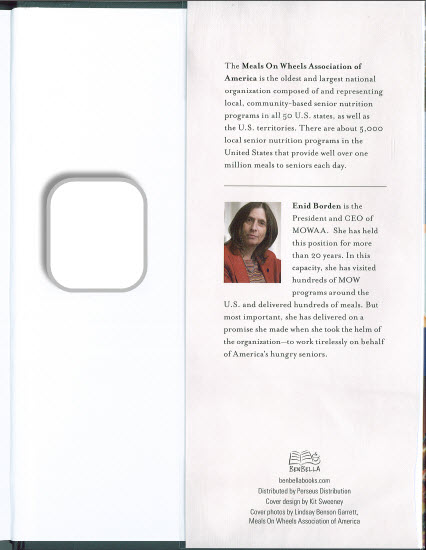

- Books with accompanying material, e.g. maps, CD-ROMs, computer disks, etc. have a pocket affixed inside the back cover
- Accompanying CDs and CD-ROMs have a hub label affixed with the last 9 digits of the barcode number written on the hub centre
- If there accompanying material affix a contents label (font should be 12pt Arial Bold) near the barcode (beside or below if information would be covered) indicating the format of the accompanying material, e.g. Contents label: 1 book 1 CD-ROM
- Apply oversize label when applicable above the spine label when an item meets the Oversize criteria.
- Easy Readers label: affix above spine label, vertically, with the “E” at the top. 100 books label: affix horizontally to spine, even on thin books.
- "100 More great books" and "Awesome starts here : 100 stories to experience before high school" labels are affixed horizontally; see EPL Booklist Labels
Physical Processing Adult Hard Cover / Permanent Collection Material
Adult Graphic Novels Label
- Affix on spine above the spine label

- Source: OL1075FP; Onlinelabels.com
- See: Print Materials, Graphic Novels, Processing for additional processing instructions.
Barcode Label
- EPL barcode applied as per diagram below
Affix the barcode to the upper right-hand corner of the back cover; approx. 1/4” from the top of the book and ½” from the right edge.
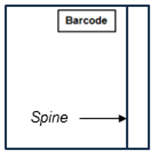
For Manga and World Languages books printed in reverse (e.g., in Arabic), the barcode is affixed on the top cover when the book’s spine rests in left hand
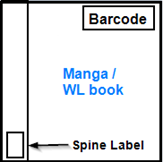
Canadian Creator Label
- Affix on spine below call number; if genre label is present, apply above the spine label

- Source: 55 021 023; Brodart
Capital City Press Collection Labels
- Affix on spine above the spine label
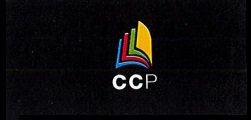
- Source: OL1075WX; Onlinelabels.com
- Affix on front cover, right side, below the title and author information, if possible
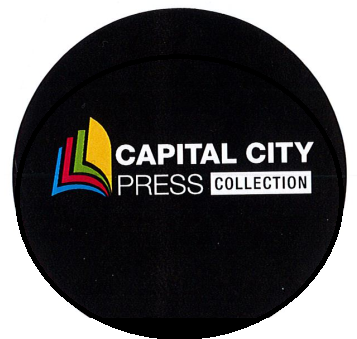
Source: OL5375WX; Onlinelabels.com
For chapbooks, affix the labels as per the image below:
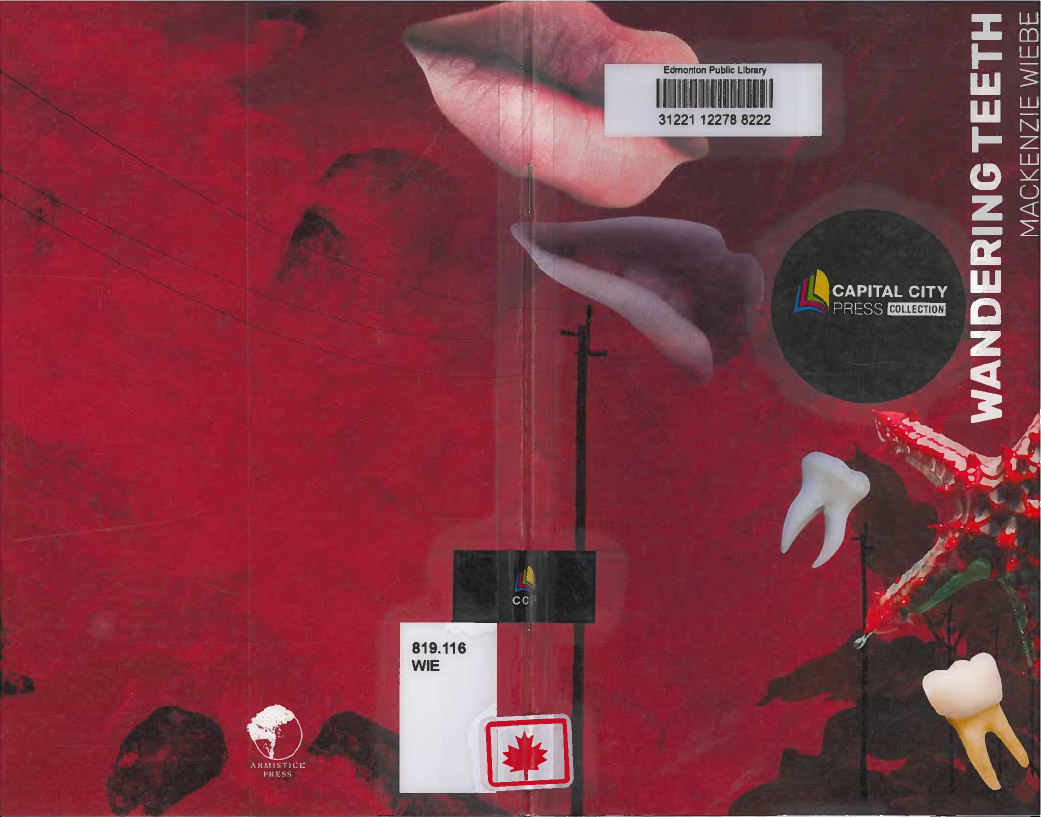
Contents Label
Applied to front cover if accompanying material is present; placement may be adjusted to avoid covering title/author info

- Source: OL1075WX; Onlinelabels.com
Genre Labels
- Affix on spine below spine label info
- Maximum of one genre label
Genre | Label | Source |
Mystery |
| 55 021 020; Brodart |
Science Fiction |  | L80-256; Carr McLean |
Fantasy | 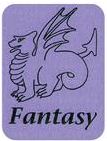 | L80-218C; Carr McLean |
Romance | 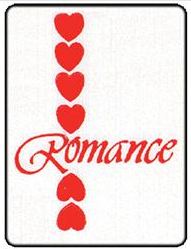 | 55 021 019; Brodart |
Westerns | 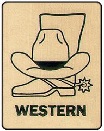 | 55 021 007; Brodart |
Short Stories |  | 55 021 086; Brodart |
Hits to Go Label
- To be applied in upper right corner of front cover or below barcode (EPL to supply)
- Affix on empty space if possible; cover author rather than title if necessary

- Source: EPL to supply
North of 52 Collection Label
- Affix on spine above the spine label (D&P to print); upon special request only
- Source: OL1067WX; Onlinelabels.com
Oversize Label
- To be applied above the spine label (LSC to supply)
- Applied to books meeting dimension criteria, see Oversize
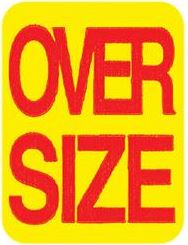
- Source: 55 021 081; Brodart
Reference Label
- For items in the Reference Collection
- One Reference Label is affixed on the spine, above the spine label
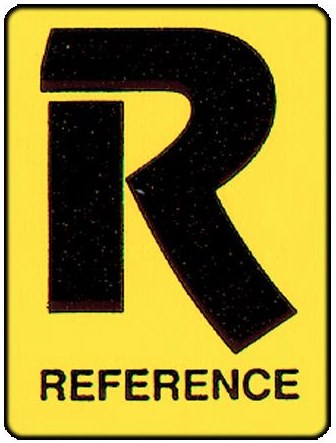
- Source: 55 021 214; Brodart
Spine Labels
- Approx. 1" x 1.25" with call number aligned to left margin; see samples below; affix on spine near bottom edge with first 3 digits clearly available
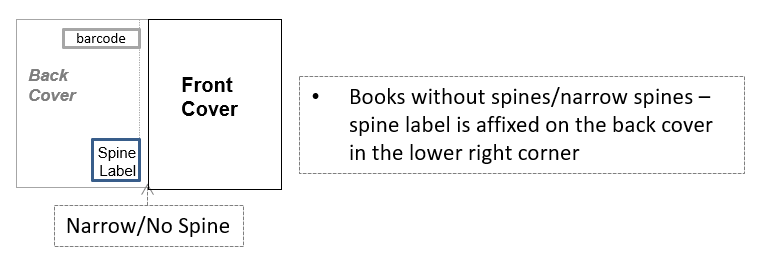
- Label font is 11 pt Arial Bold in black; max. number of lines is seven
- Use Arabic numerals for roman volume numbers on spine labels
- Spine label samples:
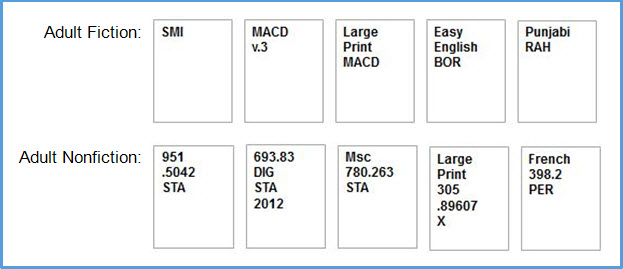
Label Placement Examples
*All labels on print material are covered with label protectors, book tape or are applied to book jackets before any lamination
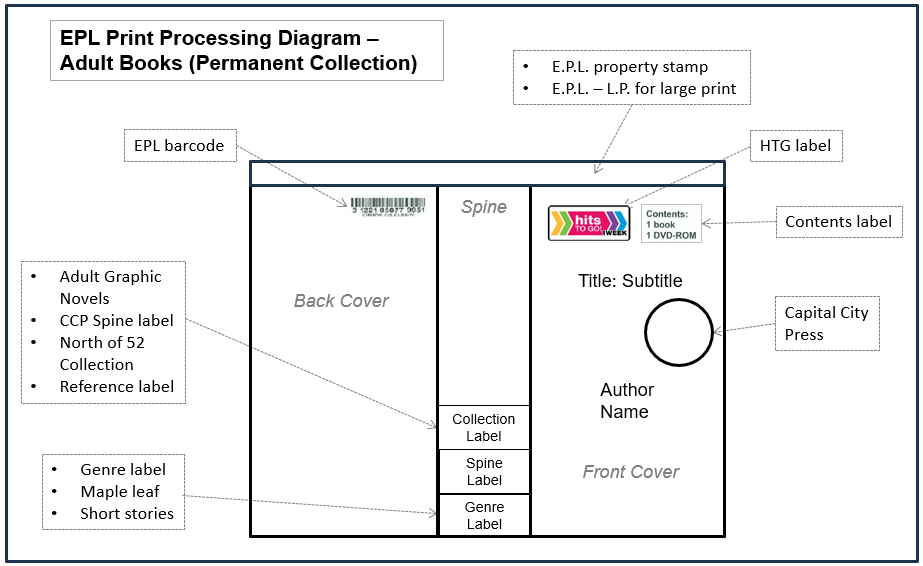
Revised: Oct. 27, 2025
